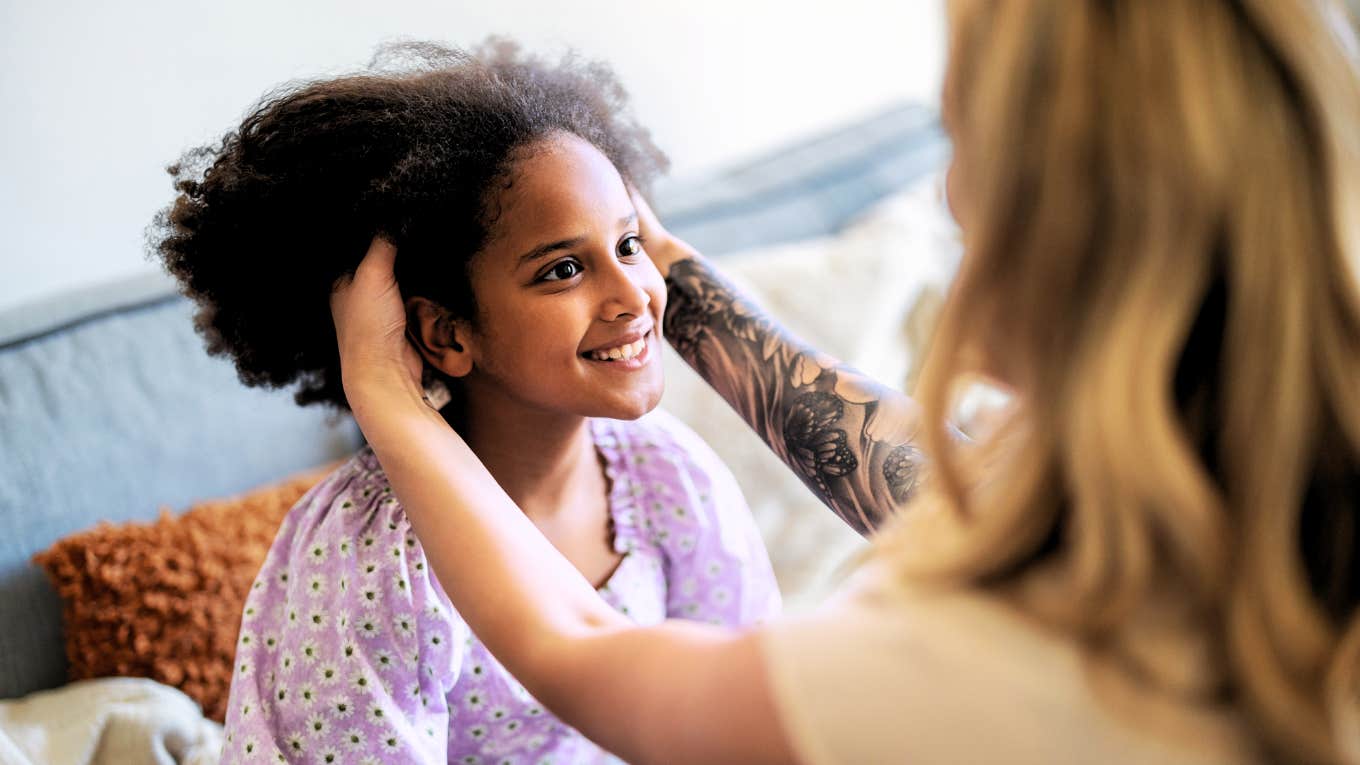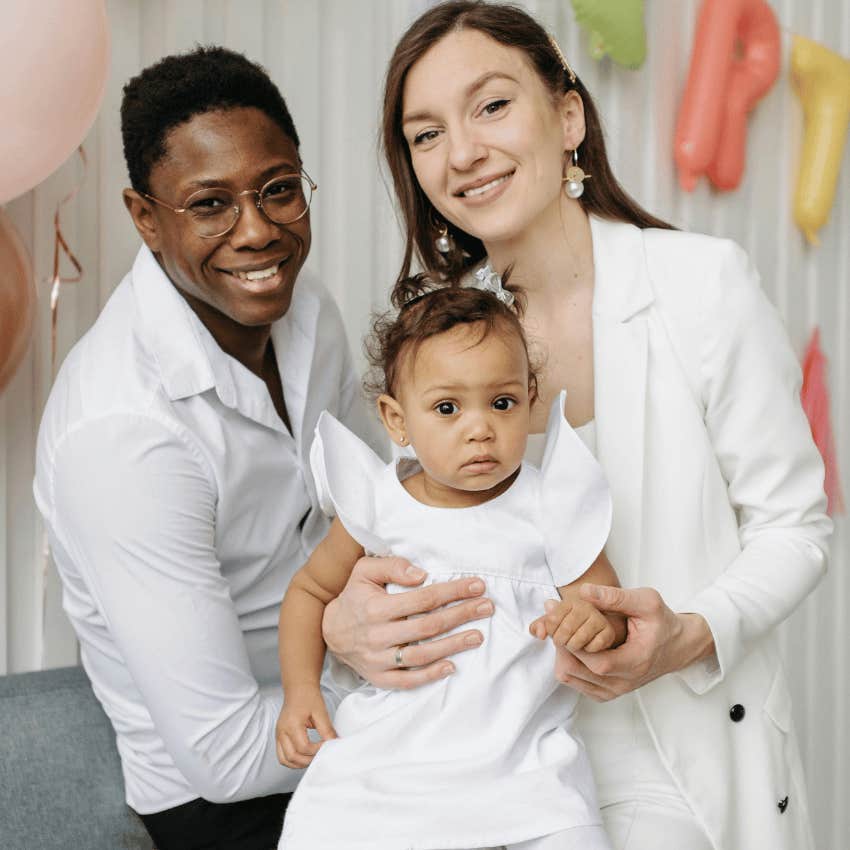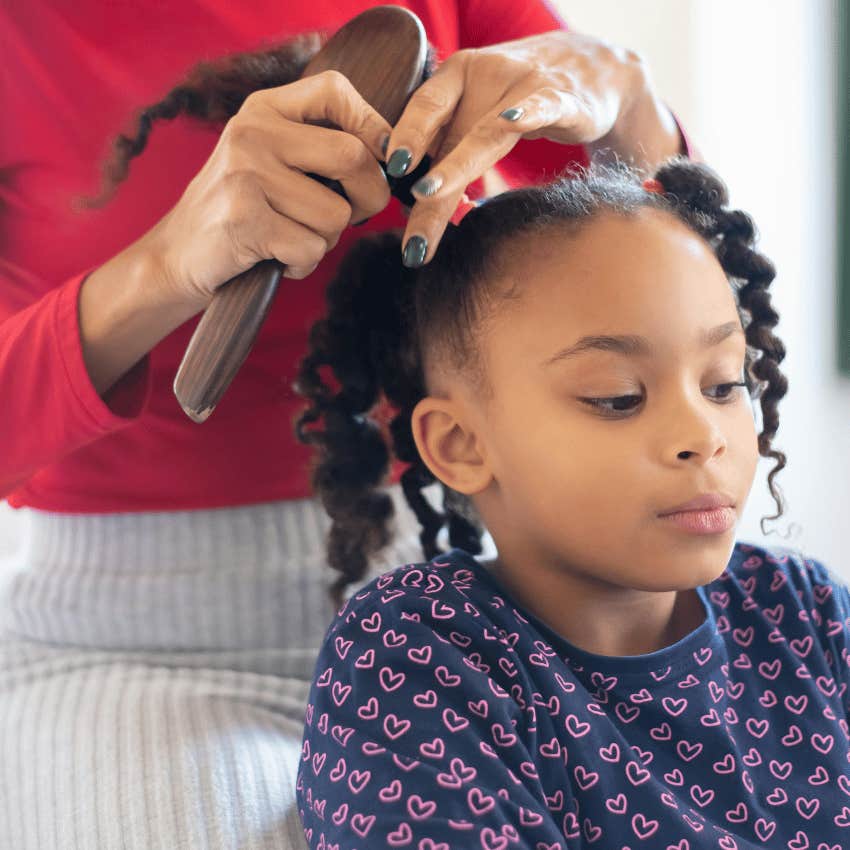I Should Have Braided My Daughter’s Hair
White mom, Black hair, and the human need for ritual and connection.
 PIKSEL | Canva
PIKSEL | Canva My daughter was born with a full head of hair, jet black and straight, which protruded from her head at various endearing angles. Everyone who saw her in her newborn days said, “Look at all that hair.”
Her hair stood in stark contrast to my thin blonde curls. It also stood in stark contrast to the gleaming bald head I’d been born with 31 years prior. Eventually, the hue of my daughter’s hair softened into a rich brown, and the strands contracted into curls, as we knew they would. For the offspring of a Black man and a curly-haired white woman, straight hair would have been genetically inconceivable.
Her father and I bathed her every night on the kitchen counter, and though she was always a bit apprehensive about the water, it was a ritual we cherished. We dimmed the lights in a futile attempt to inspire sleepiness, and I sang silly songs while I worked through her curls. They were soft and yielding between my fingers.
The baths cleaned her but did nothing to calm her. It would take at least 20 to 25 laps around the block, each lullaby sung with an increasing tenor of desperation, to finally coax her to sleep. Our second child would never get such doting nightly treatment from both parents. He was bathed a few times a week, at best, and by then, our household was a well-oiled machine of efficiency.
Luckily, he seemed to intuitively understand that we lacked both the time and patience that our daughter enjoyed — perhaps exploited is the better word — and he fell asleep without fanfare. Staying asleep was another matter, but I had to count my blessings.
Meanwhile, my daughter’s once-gentle bath time ritual no longer took place nightly, and I could no longer work through her curls with my fingers.
 Pavel Danilyuk | Pexels
Pavel Danilyuk | Pexels
Instead, I had to rely on The Dreaded Comb, which I eventually replaced with a Wet Brush, thanks to a playground mother’s helpful suggestion. My daughter’s curls had thickened over the years — they now sprang from her scalp in tight coils, which, much to my daughter’s consternation, went “up” instead of “down.”
Elsa’s hair goes down, she said. I want my hair to go down.
I gritted my teeth and cursed Disney as I carved hardwon pathways between her fierce, tenacious curls. My daughter had a thing about getting water on her face, and between having to endure this ever-present threat and the not-so-gentle ripping of her hair, bath time had evolved into a high-drama affair.
How ironic that I find myself missing this ritual. Whereas I once felt overwhelmed by human touch, frequently craving just a few hours here and there when my skin wasn’t being assaulted by other people’s bodily fluids and reaching hands, I now wax nostalgic for those days when I cooed (and yes, sometimes snapped) while wielding The Dreaded Comb/Brush.
I’d coo some more as I rinsed out the conditioner, assuring my daughter that I wouldn’t let any water touch her face (easier said than done), and eventually, I’d feel her strong, sinewy body unclench into the towel I held out for her. And though she always squirmed through my hugs, I could at least envelop her completely in my arms, taking in her soft soap smell.
My daughter is almost 13 now, and it’s been so long since I’ve even touched her hair. Well, that’s not entirely true — I extract generous clumps of it from our shower drain, but I rarely ever touch the hair that is still attached to her head.
She mostly wears it back, often with two front braids that dangle into her face, sometimes with her baby hairs artfully arranged in waves and swirls across her forehead. The rest is wrestled into a ponytail and lacquered with gel. She’s still very intent on making her hair go down.
According to the Legal Defense Fund's hair discrimination statistics, many schools across the country ban natural and protective styles are grounds for discipline or removal from school, meaning Black students have been denied educational opportunities because of their hair. 66 percent of Black girls in majority-white schools report experiencing hair discrimination.
 Kampus Production | Pexels
Kampus Production | Pexels
By white mom standards, I managed my daughter’s hair fairly well in her younger years — at least, that’s what my mother-in-law once said, which is perhaps the biggest compliment she’s ever paid me.
I understand curly hair, at least, which means I understand how frizz works, and I understand that you can never brush it dry — that is unless a poofy look is what you’re going for. I also understand, to borrow from comedian W. Kamau Bell, that you can’t ever get curly hair wet “without a plan.”
But my daughter now yearns for hairstyles that are well beyond my expertise, not to mention my budget. She wants cornrows and hair extensions, and she’s stuck with a hapless white mom who never even learned to do a proper French braid. Up until I separated from my husband last April, I’d twisted his dreadlocks every week for over a decade, but twisting and braiding are two entirely different skill sets.
So I was both grateful and relieved when a friend’s older daughter offered to help my daughter pick out hair extensions, then taught her how to map a grid across her scalp and work the extensions into dozens of tiny braids. She and my daughter spent over six hours in my friend’s living room, a few houses down from ours.
At the time, it never occurred to me to learn alongside them. I mean, first off, who has six hours for hair? I instead spent my Sunday buzzing around the house, as I am prone to spend my Sundays, ticking things off my to-do list and basking in the glow of Productivity. I can’t remember what it is I even did, but it felt oh-so-important at the time.
My friend’s daughter, a recent high school grad, was looking for work and had all the time in the world. And my tween daughter would otherwise be spending her Sunday holed up in her room listening to angsty music. So it made perfect sense for them to spend six hours braiding her hair. But me? Come on, I’m a busy mom! My time is precious, and Sunday is my Get It Done day.
It wasn’t until months later, when I spent time with my daughter’s ancestors during a guided psilocybin journey, that I realized the enormous opportunity I’d missed. I’d missed it without even thinking about it — all because I have so much trouble shaking the “time scarcity” narrative that has been drilled into me since my tweenage years.
What would I have lost if I’d taken six hours out of my day to learn how to braid my daughter’s hair? Maybe some weeds in the yard would have proliferated, maybe some unidentifiable gray juice at the bottom of the vegetable drawer would have leaked and spread, or maybe we’d have spent the week pawing through baskets of clean laundry to find our clothes.
I’m not making light of these chores — the menial tasks involved in caring for a home and managing a household are both important and undervalued — but when we’re in Productivity Mode, we inevitably begin to prioritize our busyness and self-importance.
I didn’t consciously forego an opportunity to learn how to braid my daughter’s hair because of gray vegetable juice. It wasn’t even about the household chores. It was about trying to get things in some semblance of order because once Monday arrived, it was time to prioritize my All-Important Job and it would be five work-filled days and sports-practice-filled evenings before I could come up for air.
But what would I have gained if I’d taken six hours out of my day to learn how to braid my daughter’s hair?
Well, for one, I would have gotten to spend six hours with my daughter. There are few other circumstances under which my daughter would willingly spend six hours with me these days, except maybe unless those hours involved shopping and repeated swipes of my credit card.
I would have gotten to touch her hair, the hair that’s attached to her head. I would have felt that same connection I felt during our bath time ritual all those years ago, the ritual I’d slogged through and often dreaded, but which I now look back on through the rose-colored glasses of a mom whose kids now rarely tolerate her touch.
I would have learned a new ritual that connected both me and my daughter to her Black heritage, a ritual that gives a middle finger to white supremacy culture in more ways than one. For my daughter, the braids were not about vanity; rather, they were about gaining the respect of her Black classmates, some of whom seemed to have some thoughts and feelings about “how Black” she is.
Her hair is an opportunity to lean into her Blackness, and for me, her white mom, to lean in too. It’s an opportunity to proudly sport a hairstyle that is only made possible by the uniquely luscious texture of her hair, a texture that carries centuries of oppression, resistance, beauty, autonomy, connection — and, yes, joy.
In retrospect, it is so blindingly obvious that I should have taken six hours out of my day to learn how to braid my daughter’s hair. The allure of capitalism-fueled productivity and my “hapless white mom” excuses won out instead.
Research shows that white parents of multiracial children are often, for the first time, thrust into the realities of racism and are subject to an experience from which they had previously been immune. Where they had once had the privilege of invisibility, white mothers who were raised in homogeneously white families may now face racism from both the white communities who had once embraced them and from "communities of color."
I told my daughter all this, and she said, “We can do it again, Mom. It’s not too late.” And she’s right. My fingers might be clumsy, and gray vegetable juice might ooze into the cracks of my refrigerator, and I might feel a little restless and bored.
 Thomas Chauke. | Pexels
Thomas Chauke. | Pexels
This time around, I will delight in the gentle tugging of my daughter’s hair between my forefinger and thumb, in the slowness of a ritual that pays little mind to the hours marching past, in the braiding that not only entwines brilliant blue extensions in her hair but also entwines the pain and joy of generations past.
It’s already too late for so many of the rituals we once shared — the bath times, the story times, the meandering walks around the block. The rituals during which I always felt a nagging impatience, my mind already on The Next Thing, the rituals I only learned to cherish after they had fallen away.
Entire childhoods slip through our fingers, and here I am, worrying about six hours? As my daughter has reminded me, at least this time it’s not too late.
Kerala Taylor is an award-winning writer and co-owner of a worker-owned marketing agency. Her weekly stories are dedicated to interrupting notions of what it means to be a mother, woman, worker, and wife. She writes on Medium and has recently launched a Substack publication Mom, Interrupted.

